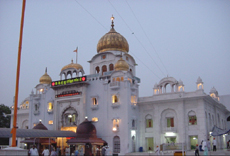BANGLA SAHIB GURDWARA
 |
A magnificent and spacious bungalow
in Delhi owned by Raja Jai Singh Amber (Jaipur) who commanded great
respect and honour in the court of Mughal Emperor Aurangzeb now enjoys
the status of a holy shrine called Gurdwara Bangla Sahib. The eighth
Guru Sri Harkishan had stayed here for a few months as guest of Raja Jai
Singh. Since then it has become a place of pilgrimage for both, Hindus
and Sikhs. They pay their respect to the memory of Guru Harkrishan,
nominated as successor by the seventh Guru, Sri Har Rai. He passed away
on October 6, 1661 A.D. When only a little over five year old, he had
been tried and tested as a perfect fearless and fully illuminated soul.
Baba Ram Rai, his elder brother became much perturbed when he learnt
that Har Krishan had been appointed the spiritual head. He tried in vain
to influence the leading Sikhs of Delhi and Punjab. Later he approached
Emperor Aurangzeb to help him acquire the Gurugadi. Consequently,
Aurangzeb agreed to summon Guru Harkrishan to see whether he was really
superior and more spiritual.
Fortunately both Raja Jai Singh and his son Raja Ram Singh were in
Delhi at that time. When approached by Sikhs for help, they agreed to
assist them in their predicament.
The Rajput chief took over the responsibility of persuading Guru
Harkrishan to come to Delhi and also gained assurance from the Emperor
that as long as he (the Emperor) was not satisfied about the succession
issue, Guru Harkrishan would stay with him in his bungalow as guest.
During his stay in Delhi. the Guru spent most of his time in serving
the humble, the sick and the destitutes for cholera and smallpox were
spreading in an epidemic form. He distributed medicines, food and
clothes to the needy. He also directed Diwan Dargah Mal to spend all the
daily offerings made by the people to the Guru for the poor. The Guru
won more admirers. Soon stories about his healing powers spread
throughout the city.
A small tank was constructed by Raja Jai Singh over the well Nowadays,
the faithful take home this water as amrit to cure their ailments. The
Delhi Sikh Gurudwara Management Committee runs a hospital in the
basement of the Gurudwara building. Besides, the Khalsa Girls School is
located in the adjoining building. A tank 225 x 235 ft with 18 ft wide
Parikarma and 12 ft wide varandah along its three sides has been
constructed entirely with people's contribution and voluntary labour.
The Art Gallery located in the basement of the Gurdwara is also very
popular with visitors. They evince keen interest in the paintings
depicting historical events connected with Sikh history. It is named
after the Sikh General Sardar Bhagel Singh who supervised the
construction of nine Sikh shrines in Delhi in 1783 during the time of
Shah Alam II.



